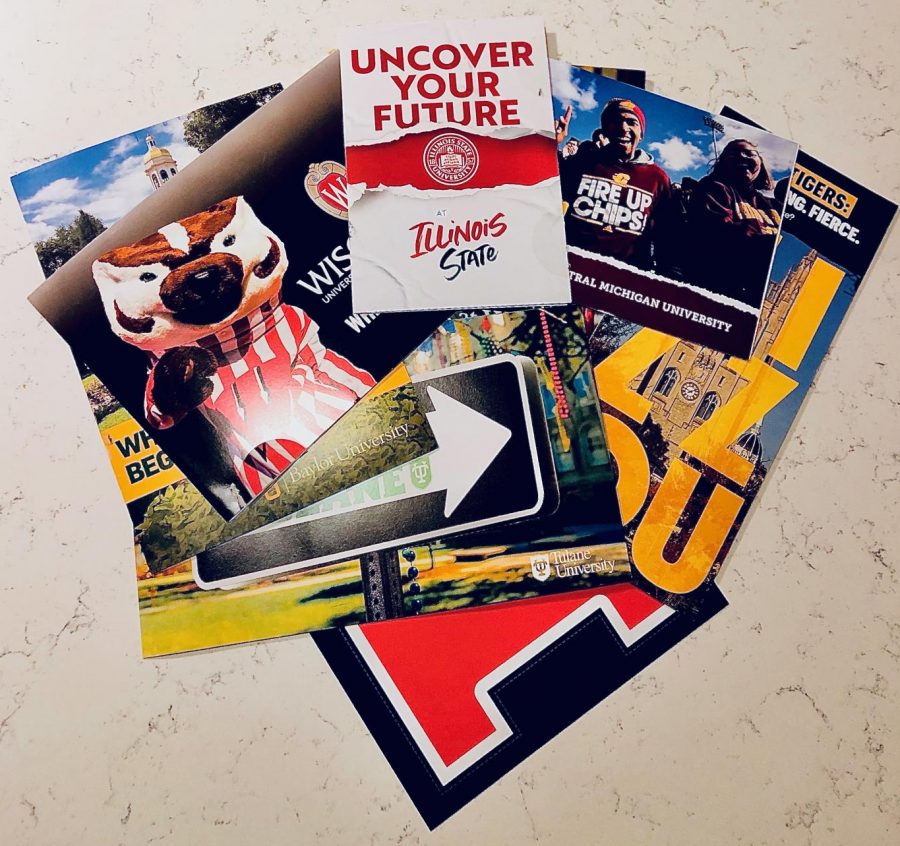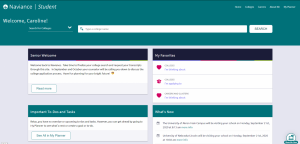The College Search Process During A Pandemic
Not only do colleges send a variety of emails to students trying to pique interest in the programs they offer, they also mail out brochures, flyers, and viewbooks to further encourage students to apply.
January 8, 2021
This year, college searches, visits and applications have had to greatly adjust due to the pandemic.
For instance, college visits are noticeably different, being held online for safety. Online visits consist of a college representative meeting with a group of students on an online platform such as Zoom or Google Meet where students can then ask questions.
“In-person visits were quite a bit more engaging,” said Calliope Saban, a senior. Lack of interest in virtual meetings means that less students are attending online visits being hosted by the school.
This year, North has set up online meetings hosted by a college representative and a counselor, in which students can sign up to join the group at an allotted time. These meetings replace in-person visits normally held in the LRC.
“There were several schools visiting where nobody would be visiting with them except a counselor,” said Matt Kirby, school counselor. Low numbers could have negative implications for students as they are less involved in the college search process, meaning they may be less informed when making the final decision.
Despite lower attendance, online visits still have many of the benefits of in-person. In fact, having less people means visits can be more personalized, with a greater opportunity to ask questions.
“To not see students take advantage of that great avenue was really frustrating,” said Kirby. Students may miss out on opportunities to ask questions and to get to know the school better.
Visiting the physical campus is also much more difficult, with in-person tours having limited attendance or not being held entirely.
“It’s hard to [narrow down schools] with not being able to visit campuses,” said Haley Davino, junior. Instead, virtual tours are available with the added benefit of self-pacing.
This year, access to standardized tests has been especially difficult. As a result, many schools opted to go test-optional, meaning standardized test scores are not required for application.
Available tests were also taken later than planned. North seniors took SATs on Sep. 23, rather than spring of junior year. To accommodate for later testing and allow for more student flexibility to maximize applications, colleges pushed back deadlines for applications.
“If they had earlier deadlines, I probably would have finished my applications over the summer,” said Saban. Procrastination arose as a result of pushed deadlines, but counselors have not noticed any major changes in terms of timeliness.
Counselors and students alike are still encouraging work to be done early.
“You can get lots of benefits like early consideration,” said senior Dominic Palermo. Reduced stress is one of the many reasons to consider applying early.
Applications are still being done online through the official college website or using Common App.
As juniors start to look more into colleges, online search websites have become increasingly important. Sites like Naviance, BigFuture or Cappex can suggest schools based on desired criteria.
Emails will be sent out providing juniors with details for when they will meet with their counselors online to discuss their plans for the future.
Where juniors are at in the search process varies greatly, but students are just encouraged to start looking at options and narrowing down what criteria they have.
“There’s some [juniors] who have literally committed to schools and that’s a little scary because it just makes you feel like you’re behind,” said Davino.
Social media and even just talking to peers can be discouraging as people flaunt their own progress.
“There’s no right or wrong; it’s what’s best for you and what you’re targeting,” said Brenna Ohlson, school counselor. At the meetings, counselors will assess where students are and help guide them through the process based on their own goals.
Finding people to talk to about the future is heavily emphasized by counselors, and it doesn’t just have to be a teacher or counselor.
“Your best counselor is a good friend, your parent, a teacher you connected with, a coach,” said Kirby. College coaches are another resource some students use.
The CCR Office is still holding informational nights online about the college application process, but presentations are adapted to fit the current changes.
“[Counselors] had to adjust their content to fit,” said John Peters, the assistant principal of College and Career Readiness.
Video presentations and other resources are available online, but are no longer being presented during class time, putting more responsibility on students to be active in their search process.



